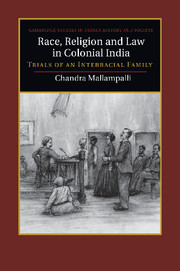Book contents
6 - Litigating Gender and Race
Charlotte Sues at Bellary
Published online by Cambridge University Press: 05 December 2011
Summary
Q. Are they or are they not members of a class whose strongest desire is to assimilate themselves to European manners, customs and usages in all matters without exception, and to avoid even the semblance of similarity to Natives in any matter whatsoever?
A. They are.
Interrogatories forwarded by the Plaintiffs to their 59th witness, the Reverend Christian Aroolapen, a Christian, minister of Saint John’s Church, a Vellalan by caste, and residing at Madras.
This chapter presents the arguments of Charlotte and Francis at the Bellary District Court and the verdict. It showcases the rich ethnographic data contained in the testimonies of their witnesses. As they responded to questions posed by vakils for each side, witnesses provided detailed descriptions of the habits, customs, and associations of the Abraham family, which, according to Bourdieu, constituted their habitus. The colonial system of personal law presumed that Hindu, Muslim, and English law corresponded to coherent sets of cultural practices. When witnesses recounted past events from their memories, however, their perspectives did not always reveal coherent social worlds. Although the questions posed to them were often aimed at establishing clear-cut boundaries, their testimonies often revealed overlapping social spaces, “mixed blood,” and hybrid identities.
The courts assumed that an Indian’s social identity (and legal status) was encoded in repetitive bodily practices or rituals prescribed by religion. Attorneys for both sides of Abraham v. Abraham were preoccupied with matters such as when Matthew had abandoned native clothes and embraced Western ones, whether Christian converts continued to abide by caste customs (including Hindu funeral rites and rules about “touching” members of lower castes), which spaces Francis occupied in the family home, including his place of seating (if any) at meals, and the jewelry worn by Matthew’s mother. Such matters would ultimately determine whether English or Hindu law would govern the family.
- Type
- Chapter
- Information
- Race, Religion and Law in Colonial IndiaTrials of an Interracial Family, pp. 149 - 183Publisher: Cambridge University PressPrint publication year: 2011



